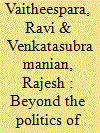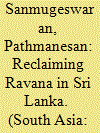| Srl | Item |
| 1 |
ID:
142828


|
|
|
|
|
| Summary/Abstract |
Wedged uncomfortably between the gathering pan-Indian nationalist movement and the locally resonant and divisive anti-Brahman, Tamil ethno-nationalist movement, Left leaders in the Tamil region in India were faced with a difficult and complex set of political choices and challenges in the early twentieth century. These political challenges brought to the fore the social and political contradictions between an anti-colonial Indian nationalism led mostly by upper-caste liberal–bourgeois leaders and an equally entrenched and locally resonant ethno-nationalist movement which, despite its social reformist and anti-Brahman platform, was led by dominant non-Brahman caste leaders committed to the continuation of British rule. In this paper, we will be looking at two of the most prominent Tamil Left leaders who attempted to work with and bridge these contradictory movements in Tamil society. M. Singaravelu (1860–1946) and P. Jeevanandam (1907–63) were prominent Left leaders and intellectuals in the Tamil region and were well known for their close engagement with and sensitivity to issues of social reform, caste and linguistic and cultural hegemony. Both joined various political movements including the Indian National Congress, the Dravidian movement and the Indian communist party in different phases of their careers. It is their participation and engagement with such diverse and contradictory movements that make their intellectual interventions unique and a close study of their work valuable for providing a window into how the Left attempted to deal with such thorny issues as the politics of caste and language in India.
|
|
|
|
|
|
|
|
|
|
|
|
|
|
|
|
| 2 |
ID:
168816


|
|
|
|
|
| Summary/Abstract |
This paper considers the appropriation of Ravana, the demon-king antagonist of the famed Ramayana epic, as a Sinhala Buddhist cultural hero in the context of twenty-first-century, post-war Sri Lanka. We highlight the irony of the recent Buddhist appropriation of Ravana as a signifier of indigeneity and sovereignty, given that he has already been employed in this capacity in the Tamil Hindu context for nearly a century. We note several convergences between the ‘Sinhala Ravana’ phenomenon and its Tamil counter-narrative, including a shared archive of textual material invoked as evidence, the introduction of alleged physical evidence as proof of Ravana’s historicity, and a sympathetic outlook on Ravana’s character, emphasising his qualities as a learned and righteous king.
|
|
|
|
|
|
|
|
|
|
|
|
|
|
|
|
| 3 |
ID:
116077


|
|
|
|
|
| Publication |
2012.
|
| Summary/Abstract |
The powerful shadow cast by the Dravidian movement on its very scholarship has meant that the focus of scholarly attention has been on the recent, institutional and secular history of the movement, with scant attention paid to its earlier religious roots. While the important role played by the pioneer Neo-Saivite elites has been noted, there have been few attempts to understand or theorise either the significance of this Neo-Saivite factor or the strategies and methods through which the Neo-Saivite revivalists fashioned and articulated a form of non-Brahmin Tamil nationalism. This paper seeks to address this lacuna by examining the largely untapped accounts of the Neo-Saivite movement written by orthodox Saivite contemporaries, who were highly critical of the movement and sought to expose both its deviation from 'true' Saivism and its political agenda. It is these criticisms of the Neo-Saivites that best illuminate how Saivism was deployed for a Dravidian and non-Brahmin Tamil nationalist project. The paper also argues that it is through a critical study of the Neo-Saivite movement that we can adequately address the question of the social base of the Dravidian movement, which has long continued to haunt its scholarship.
|
|
|
|
|
|
|
|
|
|
|
|
|
|
|
|